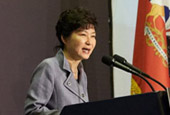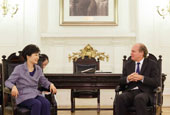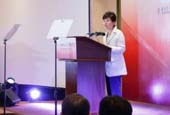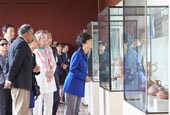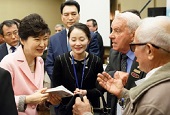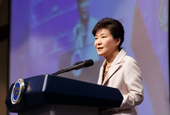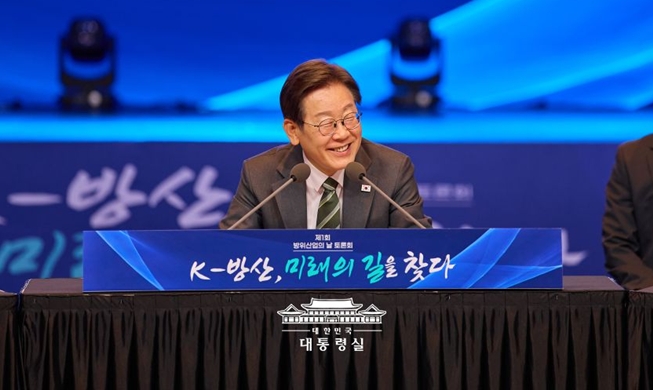According to Cheong Wa Dae, the visit expanded the president's diplomatic efforts to include South America and strengthened the country's partnership with Pacific Rim nations. This milestone, Cheong Wa Dae said, has now established partnerships that will create high value-added trade opportunities, a common market and will foster the sharing of each nation's knowledge and experience.
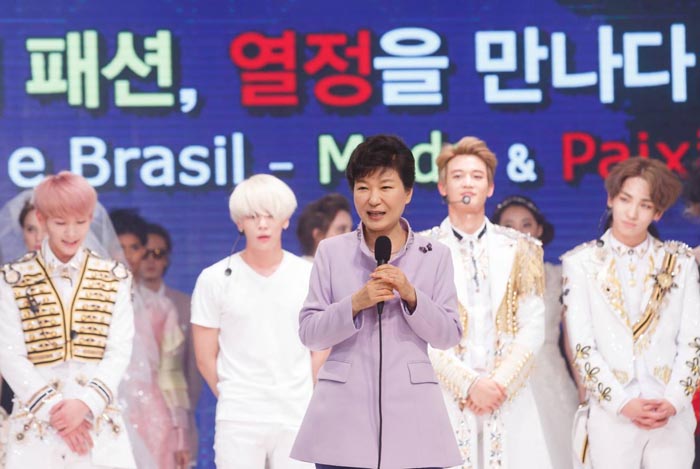
President Park Geun-hye (middle) gives the opening remarks at a Korea-Brazil fashion show that also features some Korean pop acts, in São Paulo on April 25.
Confirmation of Latin America's strong willingness to cooperate with Korea
The president's visit to the four Latin American nations helps form a basis to further strengthen current business and trade activities, and to expand partnerships across various fields. Colombian President Juan Manuel Santos stressed that it is his dream to replicate Korea's education system in Colombia. President Santos said he considers Korea to be the ideal partner for developing the Colombian education system, one of the three main goals of his National Development Plan. He expressed his willingness to promote bilateral cooperation on education and to expand access to college education.
Peruvian President Ollanta Humala called on the Korean ambassador to Peru after President Park's visit and asked about the Korean side's evaluation of the visit. He expressed his willingness to implement measures discussed during the bilateral summit between Korea and Peru.
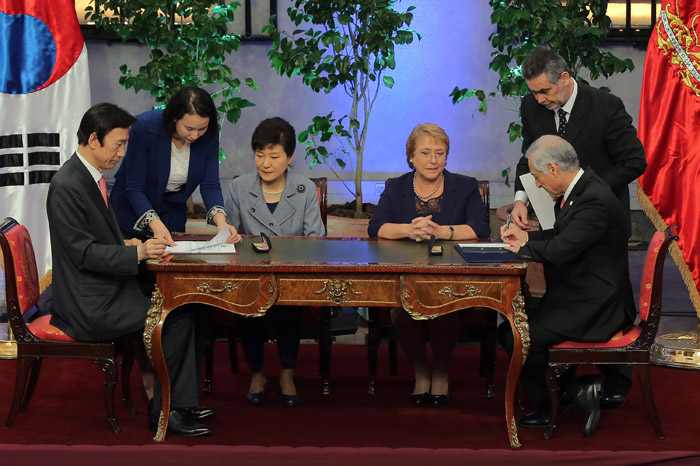
President Park Geun-hye (third from left) and Chilean President Michelle Bachelet oversee the signing of a memorandum of understanding at the presidential palace in Santiago on April 22.
Brazilian President Dilma Rousseff greatly appreciated Korea's economic success, innovation and technological competence and said she hopes to develop a strategic partnership with Korea.
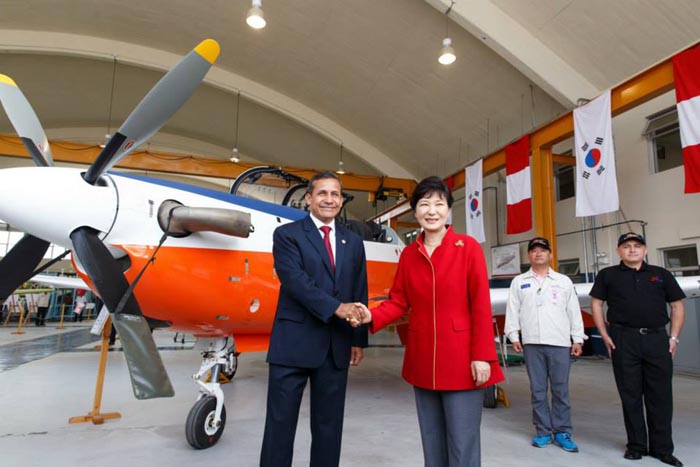
President Park Geun-hye (front row, right) and Peruvian President Ollanta Humala attend a ceremony to mark the joint production of Korea's KT-1P trainer plane at a private aviation school at Las Palmas Air Base in Lima on April 21.
Expansion of partnership from traditional areas to high value-added sectors
During the visit, President Park agreed with the South American leaders that they need to reestablish the foundation of their bilateral cooperation. In particular, they discussed cooperation not only on traditional trade, but also on high value-added sectors, including the defense industry, security, online government services, health and medical services, education, human resources and the arts. Korea and the South American nations signed many memoranda of understanding (MOUs) and founded the legal basis for mutual cooperation and co-existence.
Antoni Estevadeordal, a manager in the Integration and Trade section of the Inter-American Development Bank (BID), wrote in a column in Portafolio, a Colombian economic daily, that Korea is fast becoming one of the biggest strategic partners for Latin America and that Korea and Colombia are expected to develop an investment and trading model that will create many mutual benefits.
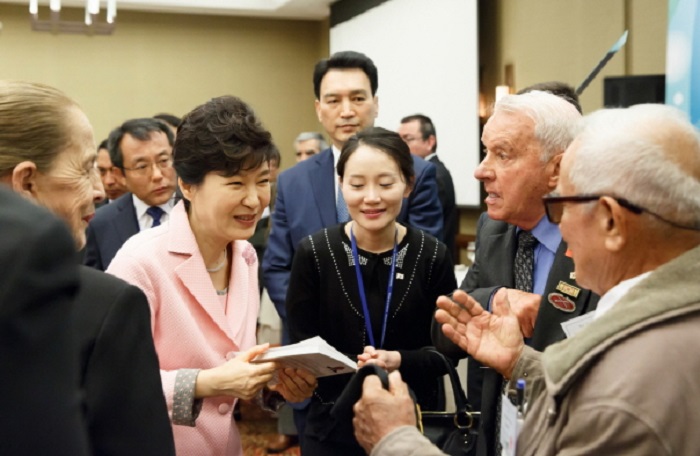
President Park Geun-hye (second from left) meets with Korean War veterans and their descendants in Bogota on April 18.
President Park's visit to Peru created a new model for cooperation that expands their bilateral partnership to include high value-added industries, as the president witnessed the successful joint production of the KT-1P, a trainer airplane, after a two-year long partnership, and its virgin flight. President Park and President Ollanta Humala agreed to extend their partnership further to include the joint production of the FA-50, Korea's multipurpose advanced trainer jet.
Expansion of bilateral exchanges to include the arts, sports, education and human resources
The president's visit also focused on expanding bilateral exchanges to include education, the arts, sports and human resources. In Peru, there was a concert for traditional music of both Korea and Peru. Korean pop groups performed in Chile, and fashion shows and more pop concerts were held on the same stage in Brazil. President Park met with representatives of Korean pop music fan clubs in Peru and helped to raise the level of closeness through other such cultural exchanges. The Americano Economia, a Chilean newspaper, reported on April 21 that the "Korean Wave," referring to the growing popularity of Korean pop music and mass media, is not a trivial cultural phenomenon but is a new engine to promote all things Korean.
The MOU covering the short-term science and engineering university internship program, the invitation to Korea of Chile's national scholarship recipients and Brazil's Science Without Borders program are all meaningful in terms of the expansion of educational exchanges and the exchange of human resources.
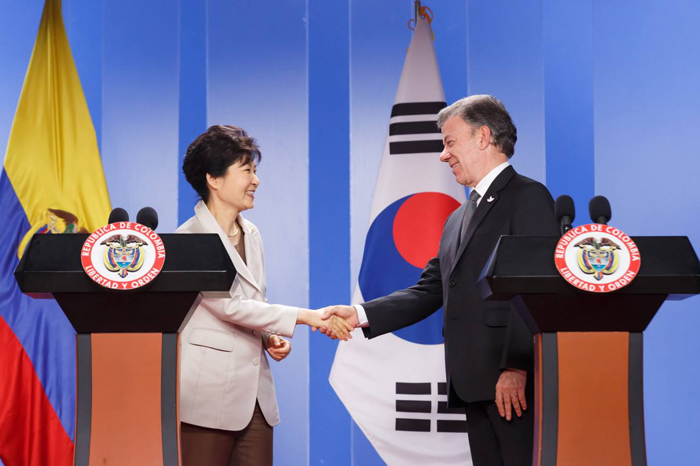
President Park Geun-hye (left) and Colombian President Juan Manuel Santos shake hands after a joint press conference, at the presidential palace in Bogota on April 17.
An MOU was signed to cover working holidays in Chile and Korea. It is expected to expand youth exchanges and contribute to the improvement of mutual understanding. The science and engineering university internship program is likely to expand exchanges of talented young people and reinforce the foundation for cooperation on science and technology.
Strengthening the partnership regarding the Korean Peninsula and regional and global issues
The president's visit was also an opportunity to reaffirm the four nations' support for South Korea in dealing with North Korea's nuclear weapons and human rights abuses. It allows for the expansion of multilateral cooperation on the international stage. President Park asked for continuous support and cooperation on efforts to encourage North Korea to make true changes in its attitude, to give up nuclear weapons program and to open its door to the international community. The four South American leaders said they support South Korea's policies toward the North, as well as Korean reunification, and will take part in efforts to denuclearize the North and to improve its human rights. The visit is expected to spread the international consensus in support of South Korea's policies for the peaceful reunification of the peninsula.
President Park and the four leaders exchanged opinions on how to strengthen their cooperative partnerships in a new Pacific Rim era.
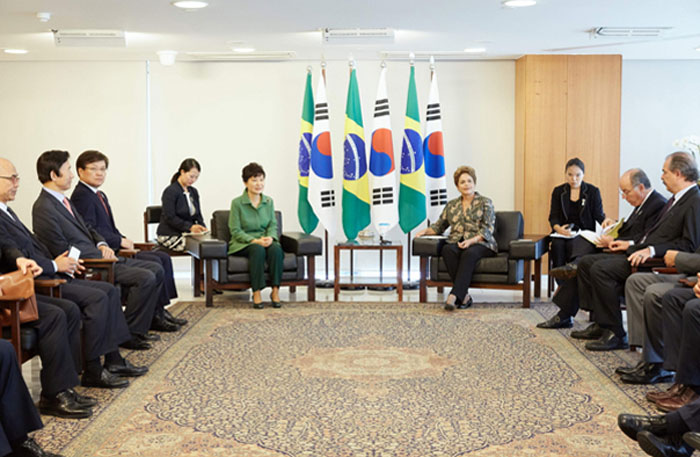
President Park Geun-hye (middle left) held a summit with her Brazilian counterpart, President Dilma Rousseff, at the presidential palace in Brasilia on April 24.
The president agreed with the need for efforts to strengthen multilateral cooperation through the "Pacific Alliance." The Pacific Alliance is an economic bloc launched in 2012 to boost competitiveness, attract foreign investment and expand economic cooperation through free trade among Colombia, Peru, Mexico and Chile. Korea joined the alliance as an observer in June 2013, and suggested the establishment of the Korea-Pacific Alliance Vision Group. Colombian President Santos stressed the importance of Korea as a partner for the alliance during the Trans-Pacific Summit in early March.
Chilean President Bachelet said she hopes to seek cooperation between the Pacific Alliance and observer countries, including Korea. The Pacific Alliance is expected to increase competitiveness through free trade, encourage foreign investment and expand cooperation across the Asia-Pacific region, and lead economic development in Latin America.
By Wi Tack-whan, Limb Jae-un
Korea.net Staff Writers
Photos: Cheong Wa Dae
whan23@korea.kr
Related Contents
Most popular
- Grammy-winning producer calls Suga of BTS 'amazing artist'
- Animated 'KPop Demon Hunters' tops Netflix charts in 41 markets
- 'Squid Game' events to pump up K-Content Seoul Travel Week
- Reunited BLACKPINK releases video preview of world tour
- 'Universal love, family' themes fuel success of 'King of Kings': director
